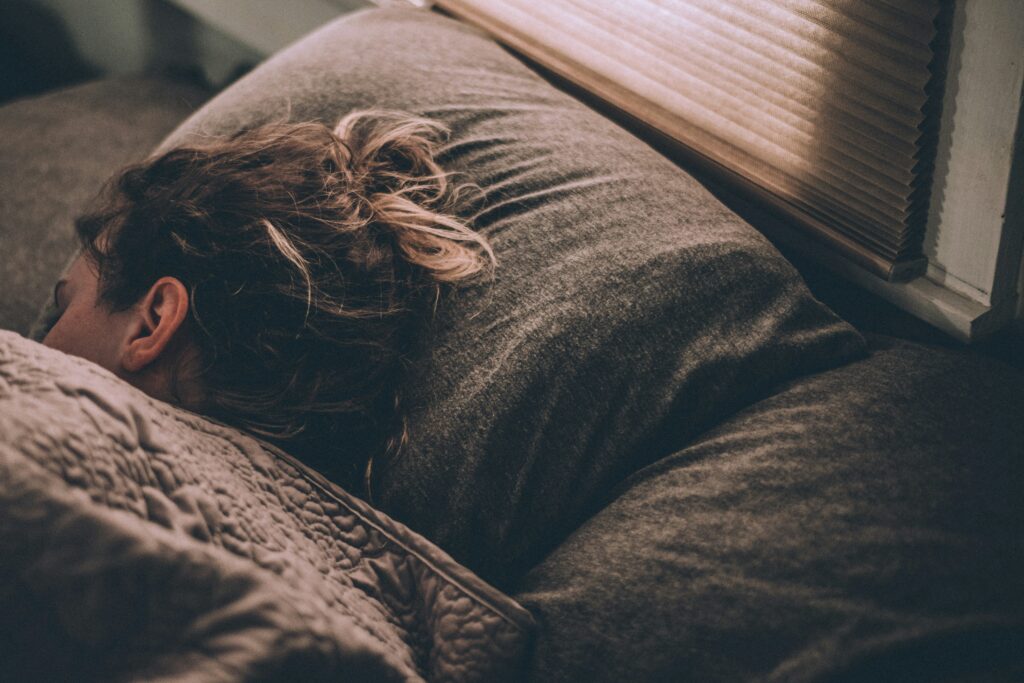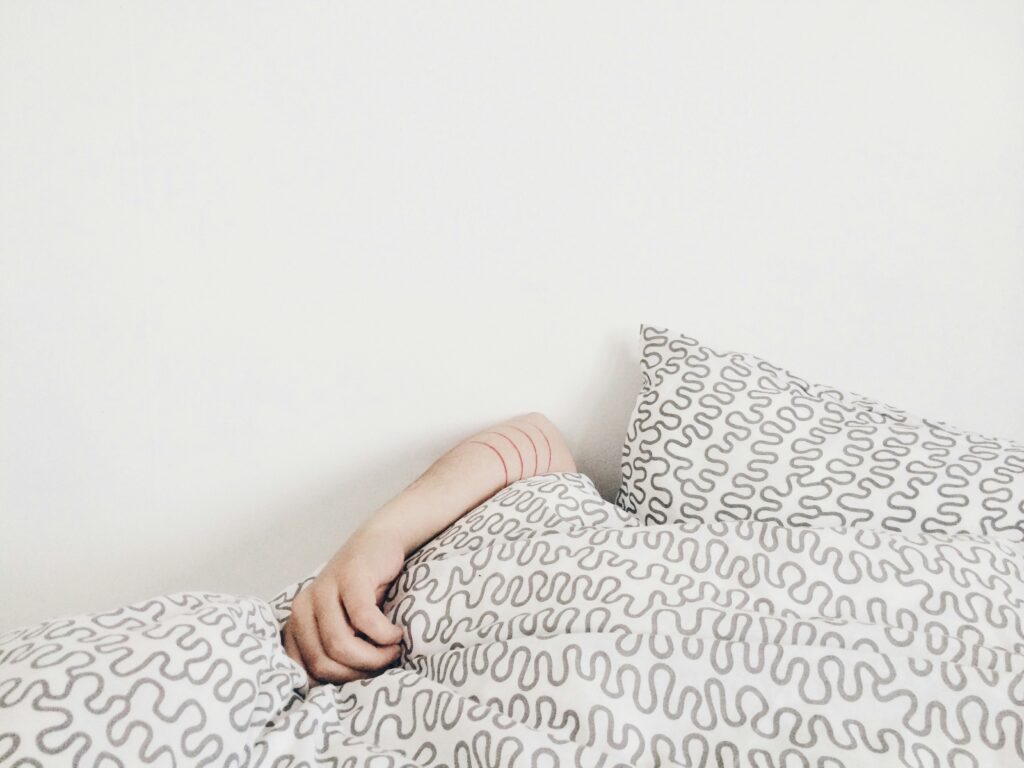
If you’re tired of feeling… well, tired—you’re not alone. Struggling to fall asleep, waking up in the middle of the night, or feeling groggy no matter how many hours you get? It’s frustrating. You know sleep is important, but no matter what you try, it feels like good rest is always out of reach.
The truth is, better sleep doesn’t come from complicated routines or miracle supplements, it comes from understanding how your body actually works. The good news? Small, realistic changes can make a huge difference in how well you sleep and how energized you feel in the morning.
This guide breaks down simple, science-backed sleep hacks that actually work—no gimmicks, no unrealistic advice, just practical changes you can start making tonight.
Let’s get into it.
The Science of Sleep: Why It Matters
Sleep isn’t just about feeling rested, it’s a critical function that affects nearly every part of your health. From brain function to metabolism to mood regulation, your body relies on quality sleep to keep everything running smoothly.
Here’s what happens when you sleep well vs. when you don’t:
1. Sleep Regulates Your Body’s Internal Clock (Circadian Rhythm)
- Your body operates on a 24-hour cycle that controls when you feel alert and when you feel tired.
- Exposure to natural morning sunlight helps signal to your body that it’s time to wake up.
- At night, darkness triggers melatonin production, helping you wind down for sleep.
Why it matters: If your sleep schedule is inconsistent, your body’s internal clock gets confused, making it harder to fall asleep and wake up naturally.
2. Sleep Affects Brain Function and Memory
- Your brain processes and stores information while you sleep.
- Deep sleep and REM cycles help with focus, creativity, and problem-solving.
- Poor sleep can make you feel foggy, forgetful, and easily distracted.
Why it matters: If you’re constantly sleep-deprived, your brain struggles to retain information, making everything feel harder and more overwhelming.
3. Sleep Impacts Stress and Mood
- When you don’t get enough sleep, your body produces more cortisol (the stress hormone).
- This can lead to irritability, mood swings, and difficulty managing emotions.
- Chronic sleep deprivation is linked to anxiety and depression.
Why it matters: Poor sleep doesn’t just make you tired—it makes everyday stress feel bigger and harder to handle.
4. Sleep Plays a Key Role in Metabolism and Energy
- Sleep deprivation disrupts hunger hormones, making you crave sugar and processed foods.
- Poor sleep slows down metabolism and is linked to weight gain and insulin resistance.
- Without good sleep, your body struggles to regulate energy, making you feel sluggish all day.
Why it matters: If you’re constantly tired and craving junk food, poor sleep could be the root cause.
If you’re not sleeping well, it’s not just an inconvenience. It’s affecting your brain, mood, metabolism, and overall well-being. The good news? You can improve your sleep by making small, simple changes that work with your body’s natural rhythms.
Now, let’s get into the sleep hacks that actually work.

Sleep Hacks That Actually Work
Now that we understand why sleep is so important, let’s get into the practical, science-backed hacks that can actually help you sleep better. These aren’t complicated or gimmicky tricks, just simple, effective changes that work with your body’s natural rhythms to help you fall asleep faster, stay asleep longer, and wake up feeling refreshed.
Optimize Your Sleep Environment
Your bedroom setup plays a huge role in the quality of your sleep. Small tweaks can make a big difference in how quickly you fall asleep and how deeply you rest.
1. Keep Your Bedroom Cool
- Your body temperature naturally drops at night to signal sleep.
- A room temperature between 60-67°F (16-19°C) is ideal for deep sleep.
- If you overheat at night, try using breathable cotton sheets, a cooling pillow, or a fan.
2. Make Your Room as Dark as Possible
- Even small amounts of light can interfere with melatonin production and disrupt sleep cycles.
- Use blackout curtains or an eye mask to block out artificial light.
- If you need a nightlight, choose a dim, warm-toned light instead of blue or white light.
3. Minimize Noise Disruptions
- Sudden noises can pull you out of deep sleep, even if you don’t fully wake up.
- Try a white noise machine, a fan, or soft earplugs to block out unwanted sounds.
- If you sleep with a partner who snores, consider using a sound machine to create consistent background noise.
Fix Your Evening Routine
What you do in the hour before bed has a huge impact on your ability to fall asleep and stay asleep.
4. Set a Consistent Sleep Schedule
- Your body thrives on routine, and going to bed at the same time every night helps regulate your internal clock.
- Try to wake up at the same time every morning—even on weekends to reinforce your sleep cycle.
- If you need to adjust your schedule, shift bedtime gradually by 15-30 minutes each night instead of making drastic changes.
5. Wind Down with a Relaxing Activity
- Your brain needs time to transition from wakefulness to sleep mode.
- Swap high-stimulation activities (like scrolling social media) for reading, journaling, light stretching, or listening to calming music.
- Try deep breathing or progressive muscle relaxation to signal to your nervous system that it’s time to rest.
6. Avoid Caffeine and Alcohol Before Bed
- Caffeine stays in your system for up to 6-8 hours, making it harder to fall asleep.
- Even if alcohol makes you drowsy, it disrupts deep sleep and REM cycles, leading to poor sleep quality.
- If you need an evening drink, opt for herbal tea or warm milk instead.
Hack Your Body’s Natural Rhythms
Your body operates on a 24-hour internal clock, and the following hacks will help you align your sleep cycle with its natural rhythm.
7. Get Sunlight in the Morning
- Sunlight exposure in the morning helps regulate your circadian rhythm by signaling to your body that it’s time to be awake.
- Try stepping outside for 5-10 minutes of sunlight within an hour of waking up.
- If you live in an area with limited sunlight, consider using a light therapy lamp in the morning.
8. Be Smart About Naps
- Naps can be great, but too long or too late can interfere with nighttime sleep.
- Stick to power naps of 20-30 minutes earlier in the day (before 3 PM).
- If you find that naps make it harder to sleep at night, try skipping them for a few days to reset your sleep cycle.
9. Try Magnesium or Herbal Sleep Aids
- Magnesium helps relax muscles and regulate melatonin production.
- Foods rich in magnesium include almonds, spinach, and bananas, or you can try a magnesium supplement.
- Herbal teas like chamomile, valerian root, and lavender can naturally promote relaxation.
Technology & Sleep
Phones, TVs, and tablets are some of the biggest sleep disruptors, but there are ways to manage screen time while still winding down properly.
10. Reduce Blue Light Exposure Before Bed
- Blue light from screens tricks your brain into thinking it’s daytime, suppressing melatonin production.
- Use blue light filters on your phone, laptop, and TV in the evening.
- Try switching to night mode on your devices or using blue light-blocking glasses if you need to be on screens late at night.
11. Swap Scrolling for Audiobooks or Sleep Meditation Apps
- If you usually unwind by scrolling social media, switch to a low-stimulation alternative.
- Listening to audiobooks, sleep stories, or guided meditations can help you relax without the mental stimulation of a screen.
- Some great apps to try: Calm, Headspace, Insight Timer, or Noisli for sleep-friendly sounds.
12. Charge Your Phone Outside the Bedroom
- If your phone is within reach, it’s tempting to check notifications or scroll mindlessly.
- Keeping it in another room removes the temptation and improves sleep hygiene.
- If you use your phone as an alarm, consider getting a separate alarm clock to reduce nighttime screen time.
Better sleep isn’t about drastic lifestyle changes—it’s about small, intentional adjustments that support your body’s natural sleep cycle. By optimizing your sleep environment, creating a relaxing nighttime routine, and reducing screen exposure, you can dramatically improve your sleep quality.
If you’re struggling with sleep, start by trying one or two of these hacks and see how they affect your rest. Over time, these small changes will add up, helping you fall asleep faster, stay asleep longer, and wake up feeling refreshed.

What to Do If You Still Can’t Sleep
Even with the best sleep habits, there are nights when sleep just won’t come. Whether you’re lying awake overthinking, waking up in the middle of the night, or tossing and turning for hours, it’s frustrating, but there are ways to reset your sleep without making it worse.
Here’s what to do when you just can’t seem to fall asleep or stay asleep.
1. Stop Forcing It—Get Out of Bed
- If you’ve been lying awake for more than 20 minutes, don’t keep struggling.
- Instead, get out of bed and do something calming and low-stimulation—like reading, deep breathing, or listening to soft music.
- Staying in bed while frustrated trains your brain to associate your bed with stress, making future sleepless nights worse.
What to try instead: Go to a dimly lit room and do a relaxing activity until you feel sleepy again.
2. Try Progressive Muscle Relaxation (PMR)
- When you’re restless, your body might be carrying hidden tension.
- Progressive Muscle Relaxation (PMR) is a simple technique where you tense and then relax different muscle groups one by one.
- This signals to your nervous system that it’s time to calm down and sleep.
How to do it: Start with your toes—tense them for 5-10 seconds, then relax. Move up to your legs, abdomen, hands, arms, shoulders, and face.
3. Use the 4-7-8 Breathing Technique
- Controlled breathing slows the heart rate, reduces stress, and helps your body transition into sleep mode.
- The 4-7-8 method is one of the simplest and most effective techniques for calming your nervous system.
How to do it:
- Inhale deeply through your nose for 4 seconds.
- Hold the breath for 7 seconds.
- Exhale slowly through your mouth for 8 seconds.
- Repeat 4-5 times until you feel more relaxed.
4. Lower Your Body Temperature
- Your core body temperature naturally drops as you fall asleep.
- If you feel too hot, your body struggles to reach deep sleep.
Quick fixes:
- Try sticking one foot out of the covers—it helps release body heat.
- Take a warm shower before bed—this raises body temperature temporarily, but as you cool down, it triggers sleepiness.
- Turn down the thermostat to 60-67°F (16-19°C) for optimal sleep conditions.
5. Try a Brain Dump or Journaling
- If racing thoughts are keeping you awake, try writing them down.
- A “brain dump” helps clear mental clutter so your mind can relax.
- You don’t need to write a full journal entry—just a few bullet points of what’s on your mind.
Bonus tip: If you tend to wake up with anxious thoughts, keep a notebook by your bed to jot things down and reassure yourself that you can deal with them tomorrow.
6. Don’t Check the Clock
- Watching the minutes tick by creates stress and pressure to fall asleep.
- Clock-watching triggers anxiety about not getting enough sleep, which actually makes it harder to sleep.
What to do instead: Turn your clock away from view, or use a non-digital alarm that doesn’t show the time.
7. Get Some Light (Only If It’s the Right Kind)
- If you wake up in the middle of the night, don’t turn on bright lights—this tells your body it’s morning.
- Use warm, dim lighting if you need to get up for any reason.
- If early waking is a pattern, try getting more natural light in the morning to reset your circadian rhythm.
8. Consider a Magnesium or Herbal Supplement
- If you frequently struggle with sleep, you may have a magnesium deficiency, which plays a role in muscle relaxation and melatonin production.
- Herbal supplements like valerian root, chamomile, and passionflower have natural sedative effects.
What to try:
- Magnesium glycinate is the best type for sleep.
- Herbal teas with chamomile or valerian root can help relax the body before bed.
If sleep still isn’t coming, don’t panic. The worst thing you can do is stress about not sleeping, as that only makes it harder. Instead, use one of these simple techniques—whether it’s deep breathing, journaling, or changing your environment—to reset your body and ease into sleep naturally.
If sleepless nights become a frequent issue, it might be worth looking at lifestyle habits, stress levels, or underlying health conditions that could be disrupting your rest. But for occasional rough nights, these strategies can help you fall asleep faster and wake up feeling more refreshed.
Good sleep isn’t just about how many hours you get—it’s about the quality of those hours. If you’ve been struggling with restless nights, constant fatigue, or waking up feeling groggy, the good news is that small changes can make a big difference.
Better sleep doesn’t require a complete lifestyle overhaul. It comes from simple, science-backed adjustments—like setting a consistent bedtime, reducing screen time before bed, keeping your room cool and dark, and using relaxation techniques when sleep won’t come easily.
If you’re not sure where to start, try choosing one or two sleep hacks from this guide and testing them for a week. Pay attention to how your energy, focus, and mood change. Over time, these small shifts can retrain your body to sleep more deeply and wake up feeling truly refreshed.
What’s one sleep habit that has worked for you? Let me know in the comments—I’d love to hear what helps you get better rest!
Leave a Reply
You must be logged in to post a comment.